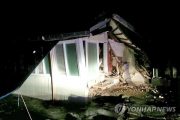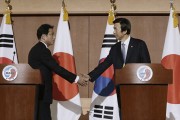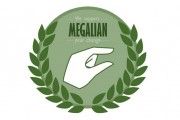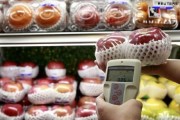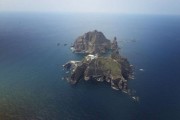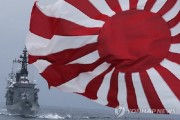After the Tokyo Electric Power Company (TEPCO) announced on July 22 that Japan’s crippled Fukushima nuclear plant is continuing to leak radioactive water into the sea, persistent Korean safety concerns intensified. By the beginning of August, Korea’s Prime Minister took the significant step of asking his government to punish any Korean who spreads “malicious rumors” about radiation in Japan, saying that the risks were being exaggerated. Koreans reacted with fresh outrage that their own government appeared to be covering up the extent of the danger from Japan and argued that more should be done to inspect all imports that could be contaminated.
From Yonhap News:
Prime Minister Jeong: “Rumor-mongering about Japan’s radiation problems will be punished and eradicated”
On August 2nd, in reaction to rumors spreading through the internet and social media, Prime Minister Jeong Hong-won ordered his administration to punish malicious rumor-mongering related to the nuclear radiation problems in Japan.
At the 14th meeting of the regular national policy adjustment team, Jeong said, “False rumors can spread quickly through the internet and SNS (social networking services). This could disrupt our society by instigating fear and anxiety.”
In recent days, the internet has been full of talk that half of Japan’s land is contaminated by high radiation, that more than 90% of imported pollack fish are from Japan, and that the Korean government has purchased ₩1.2 trillion of radioactive contaminated fish from Japan to control the price.
Jeong said, “I hope all bureaus quickly respond to rumors that are causing trouble in citizens’ daily life and let people clearly know the facts in order to resolve their fears.”
[……]
Comments from Naver:
kumo****:
Is that what the Prime Minister of Korea is supposed to say? He is supposed to say there will be thorough investigations to ensure safety since there have been reports raising concerns. Saying nothing at all would have been better than what he ended up announcing.
soho****:
For a moment, I thought he was the Prime Minister of Japan…ke ke ke.
wift****:
Which country’s Prime Minister is he? ke ke ke.
yt4c****:
Even Japanese people don’t trust their own government. Does he want Koreans to trust the Korean government speaking on behalf of the Japanese government????
suju****:
If you have human resources to monitor and punish rumor-mongers, what about instead assigning them to transparently monitor what seafood is imported from Japan? If people don’t trust you, don’t you have to think about how to gain trust first? Very simple-minded.
dazi****:
How about dealing with the rumors from the Japanese politicians that Dokdo is Japan’s territory or Korean girls were sold to the Japanese army by their parents during the colonial period? Where are you from, Prime Minister Jeong?
kade****:
I thought it was the Japanese Prime Minister making these ridiculous statements. Where on earth is Prime Minister Jeong from?
dong****:
I’m at a loss for words… How can someone like him be the Prime Minister… Heol~
ahnj****:
You shouldn’t brush them off as rumors. You should do investigations first to reassure people and tell them whether they were indeed rumors.
tama****:
Is he really the Prime Minister of Korea? Instead of reassuring people, he is going to just punish those who write about radiation problems? It’s true that Japan is going under. After the nuclear accident broke out in Japan, there are many more Japanese people trying to buy land in Busan!!
triadica:
Prime Minister Jeong….you are pathetic. The radiation ‘rumors’ are created because the Japanese government is not transparently releasing information. Starting two years ago, serious concerns were raised regarding the region’s contamination. But it was only on the day following their [House of Councillors] election that Japan officially admitted to the problem. Isn’t our government supposed to collect information from every channel and check on the distribution system to ensure people’s health? Recently, there have been concerns about mackerel and pollack imported from Japan. What is the Prime Minister doing in this situation? He’s out of his mind.
toma****:
How can someone like him be the Prime Minister? When he said he will make it possible to delete school bullying records after graduation without realizing how serious the problem is, I knew he had some issues. Instead of chasing rumor-mongers, you should take the matter seriously and do total inspections on Japanese imports. Wake up and work properly. The government should do inspections thoroughly to reassure people instead of chasing rumors.
jkpa****:
I’m dumbfounded. It almost sounds as if he is talking to our citizens on behalf of the Japanese Prime Minister.
soha****:
If you claim it’s safe, you can eat it. I won’t buy it for my family.
satr****:
He must be bored… You must get punished whenever you criticize Japan… Please come to your senses..
From OhmyNews:
The truth can only be found in rumors about Japan’s radiation problems: don’t be surprised
On August 2nd, Prime Minister Jeong Hong-won dismissed the internet rumors about Japan’s radiation problems, one of which is that half of Japan’s land is highly contaminated with radiation. He ordered his administration to chase and punish malicious rumor-mongers. He regarded the rumors as a ‘socially disruptive factor that degrades people’s happiness’.
However, Prime Minister Jeong’s statement is inappropriate since he is an official who should prioritize citizens’ health and safety. A variety of information is collected on the internet. People from all walks of life share and confirm various information and claims about Japan’s radiation problems. What Jeong called ‘rumors’ is verified and sorted out in various ways.
The reason why incorrect information can be spread is because the government only brushes off concerns and claims it is ‘safe’ without providing proper information. If you look into the controversies related to the Fukushima nuclear plant, there is some incorrect information but it is hard to dismiss it as completely false.
Radioactive materials spreading out in Japan
First, let’s take a look at the claim that half of Japan’s land has already been contaminated by high radiation. According to a PNAS publication from December, 2011, most of Japan’s land has been affected by cesium-137, as seen in this map of the estimated concentrations.
Of course, there are different opinions about contamination standards. Compared to the 10 Bq/g limit for low and mid-level radioactive waste, the level of soil contamination is low. However, if you consider the possibility of accumulation in the food chain, soil with concentrations higher than 5 Bq/kg is still worrisome.
Cesium-137 and 134 soil contamination shown in the map published by Japan’s Ministry of Education, Culture, Sports, Science and Technology (MEXT) is smaller than what the PNAS map shows. This map shows the level of contamination per square meter. Based on the map, the Japanese government selected eight prefectures, which is 3% of Japan’s land, for radiation cleansing.
Japan’s ‘prefecture’ is equivalent to a ‘province’ in Korea. It is highly possible that agricultural and marine products from other prefectures besides Fukushima have been contaminated. The map of cesium contamination in freshwater fish from Fukushima and Eastern Japan published by the scientific journal ‘Nature’ reveals a more accurate situation. It is a map based on direct measurements of contaminated freshwater fish. It shows that central Japan from Fukushima to Tokyo is contaminated by cesium. According to the map, it seems inevitable that a significant amount of agricultural and marine products from Japan is contaminated. It is just a matter of degree. Even if they cleanse radiation, there is a clear limit to what you can do to forests, lakes, ponds, rivers, etc. There is no way to stop spreading of contamination through winds and groundwater.
The Japanese government plans to send the waste from the tsunami to other locations in Japan and incinerate it. It has been reported that it is possible that radioactively contaminated debris is included in that waste. There are 22.5 million tons of waste from the tsunami. 20 million tons will be processed in the affected region and the rest will be distributed throughout the country and processed by March of next year. Although it may be small amounts, it is possible that radiation will be found all over Japan.
Japan imposing the radiation safety myth
What draws attention is the attitude of the Japanese government. They are imposing the radiation safety myth that replaced the nuclear plant safety myth they used to tell their citizens. They designated a ‘preparation zone’ within which the radiation was recorded at 20 mSv, still 20 times higher than the annual dose limit for the 150,000 residents who fled because of the nuclear plant accident. You are not allowed to stay in the zone overnight but you can visit there during the day. After the cleansing process, it seems they will lift the travel restrictions, starting with the residential areas. However, this is in contrast to the Soviet government who forced people to migrate out of any contaminated areas that had higher than 5 mSv following the Chernobyl accident.
The second rumor, that the Japanese government is strictly controlling information related to radiation, is clearly incorrect. It is possible that the news about the bill known as the ‘Secret Information Protection Law’, which would punish leaking of national secrets, has been misrepresented. However, the Japanese government’s cover ups and delays in releasing information since the Fukushima accident has done nothing to resolve the lingering suspicion that gives life to these rumors.
The third claim is that fish and vegetables from Japan should not be consumed. In 2012, 93% of all unfrozen pollack consumed in Korea was imported from Japan. For frozen pollack, only 1.6% came from Japan while most of them were from Russia. However, there is no point in distinguishing their countries of origin because highly contaminated water from the Fukushima plant moves along with the ocean currents near the Russian shore.
Also, it is possible that pollack near the Japanese shore move to the Russian shore because they are migrating fish. For marine products, you have to actually check for radiation contamination and not just the place of origin. From April to December in 2011, Korea reported finding twenty-one cases of contamination of fish from Japan containing up to 98 Bq/kg. In 2012, 101 cases were reported, with the highest concentrations reaching 25 Bq/kg. This year, there have been fewer cases of contaminated fish. Eight cases have been reported so far this year, with the most contaminated having readings of 10 Bq/kg. However, the Korean government doesn’t do regular inspections on marine products that are not from Japan.
When it comes to inspections, the government’s preferred term, ‘undetected’, is not scientific at all. Depending on the detector’s sensitivity or time of inspection, ‘undetected’ can be changed to ‘detected’. There is also a controversy about the government’s use of the term ‘suitable for consumption’. According to them, less than 370 Bq/kg is ‘suitable for consumption’. This standard is for adult men. Women get affected by radiation more than men and babies or fetuses are much more sensitive. There is a claim that babies are twenty times more sensitive to radiation than adult men. What’s ‘suitable’ for adult men can be ‘unsuitable’ for women or babies. The German-Swiss Association for Radiation Protection suggests 8 Bq/kg for adults and 4 Bq/kg for children as the safety limits. Since even those numbers are for emergency situations, zero radiation is the best.
The problem lies ahead. One of the representative radioactive elements, cesium-137, has a half-life of thirty years. The cesium-137 in Chernobyl still hasn’t reached its half-life. Humanity had not experienced high radiation contamination in the sea before. Radioactive materials can spread throughout the whole Pacific Ocean following the ocean currents. The seas around Korea are no exception. According to a paper published last year, it is estimated that a considerable level of cesium will reach the southern sea of Jeju this year or next year. We need comprehensive measures for marine products.

Distribution of cesium-137 in surface seawater between 2012 and 2041
(Journal of Environmental Radioactivity)
The fourth rumor is about why the Australian and Canadian embassies stopped visa services in Japan. It is true that they stopped their services. The Australian embassy in Korea and the Canadian embassy in the Philippines took over the job. No clear reason has been mentioned. We can’t confirm whether it is because of the radiation problem in Japan. It is better to investigate than to brush it off as a rumor.
Fukushima accident is still ongoing
Lastly, there is a rumor that the amount of radiation leaked from the Fukushima accident is eleven times higher than that from the Chernobyl accident. If you compare the amount of leaked radioactive materials, the Chernobyl accident was worse. In Chernobyl, the nuclear reactor itself exploded while in Fukushima, only the containment buildings were damaged by explosions.
However, in Fukushima, three nuclear reactors went through core meltdowns and the containment buildings were damaged. The spent nuclear fuel storage building was also damaged by explosions. The number of spent nuclear fuel rods in Fukushima (4604) is 6.6 times higher than that of the Chernobyl plant (699). There is a possibility that the Fukushima plant may become a bigger problem.
The problem is that the Fukushima accident is still ongoing and contaminated water keeps flowing into the sea. They just took some pictures with a robot inside the reactor No. 1. They haven’t been able to touch the No. 2 and 3 reactors. We don’t know how deep the melted fuel has reached under the ground or whether it is possible to contain contaminated groundwater effectively.
The reactor No. 4’s spent fuel storage building was weakened by the earthquakes. If there is another strong earthquake, there could be a situation where all residents of Tokyo have to evacuate. Apart from the contaminated water flowing into the sea, there are 360,000 tons of radioactive water in the area, and the amount is only increasing even with recycling. There is less and less room for storing liquid nuclear waste. The maximum holding period for the containers for liquid nuclear waste is only five years. It will only lead to more problems later.
It is also hard to deal with radioactive materials leaked into the sea. While it is not easy to judge which incident is bigger, Chernobyl or Fukushima, what’s clear is that the Fukushima incident is still ongoing and there will be more damage in the future. This is why nuclear plant accidents are not comparable to car accidents, plane accidents or natural disasters. The leaked radioactive materials will bother us for centuries.
Although it may be a logical decision in order to begin rebuilding the affected region, the Japanese government has chosen to try to minimize the damage. The reality is that Japanese citizens don’t trust their government and there are some people who only drink imported water. It is regrettable that the Prime Minister of Korea is playing the role of a spokesperson for the Japanese government instead of caring about Korean citizens’ health and safety. Radioactive contaminated food should be included in the ‘unhealthy food’, which is one of the four evils President Park pledged to eradicate.
“No matter how low the radiation is, it can increase the chance for cancer.”
That conclusion is from the American National Academy of Sciences’ report entitled ‘Biological Effects of Ionizing Radiation VII‘. That means safety limits on radiation don’t really guarantee safety from cancer.
Radioactive materials are officially carcinogens. They cause genetic diseases that can be transferred to future generations. It induces musculoskeletal diseases and weakness. Aging is accelerated. Any small amount of radiation affects the human body. However, the nuclear power industry doesn’t admit it. They are loyal to the argument that amounts of radiation under their ‘limits’ are safe.
Prime Minister Jeong threatened to punish rumor-mongers instead of caring about people’s safety. He should be taking action against the Korea Food & Drug Administration (KFDA) and the Nuclear Safety & Security Commission (NSSC) that promote the radiation safety myth. The nuclear mafia is at work here. They are trying to trivialize the dangers of radiation.
Comments from Naver:
edit****:
Since it has become an issue that receives lots of attention and causes fear, wouldn’t you think the Japanese Prime Minister or high ranking officials would visit the affected area, eat sashimi and swim if it was really okay?
devi****:
Our relationship with Japan isn’t even that good right now, what is he defending them for? Other countries are all being careful but why is Korea being like this? Are the politicians a bunch of collaborators?
okid****:
Prime Minister Jeong, why don’t you make your wife and children eat a soup made with pollack from Japan?!
chrh****:
Prime Minister Jeong should first eat food imported from Japan in front of TV cameras.
bbq1****:
The solution is to not eat fish and not visit Japan. The Prime Minister is supposed to make the truth clear but he’s trying to cover it up…
yiso****:
That was conscientious journalism.
oheu****:
Prime Minister Jeong might be the only fool who believes that the information released by Japan is accurate.
yeji****:
The government always tries to dismiss rumors without thorough investigations. ㅡㅡ Same with the human trafficking issue. Doesn’t he feel sorry for his citizens? The world is coming to an end for real.
west****:
Rumors or not, the government is supposed to thoroughly secure food safety, but know it is trying to punish critics? How on earth can the people trust their government?
wlsr****:
Wow~~ There must really be something going on.. When the search word ‘cesium’ was ranked high on the portal site, it was deleted right away… It is being manipulated~~ I guess it really is unsafe.
From Money Today:
Holes in radiation inspection… “no preemptive measures available”
While radioactive contamination rumors about agricultural and maritime products from Japan have been spreading through social media and the internet, the government has repeatedly reported that no contaminated food has been found in Korea. However, there is a serious lack of radiation detectors at sea ports and airports. Even if a pile of contaminated products crosses our borders, there is no way to identify it before it has left Japan.
The Korean government banned 49 kinds of marine products from eight prefectures in Japan. Those weren’t banned by the Korean government independently, Japan prohibited exporting them. In the first half of this year, 13,080 tons of marine products have been imported from areas of Japan outside the eight designated prefectures. The Ministry of Oceans and Fisheries (MOF) reported on August 2 that no radioactive material was found during 159 inspections on 14 different kinds of marine products. They explained that small amounts of iodine (3.65~5.25 Bq/kg) were found in kelp on six occasions, but the amounts were well below the safety limit (300 Bq/kg). The Ministry of Agriculture, Food and Rural Affairs (MAFRA) reported to the Prime Minister on July 31 at an emergency meeting that no radioactive contamination has been found during inspections. The KFDA also reported that they increased the scope of inspections on Japanese marine products to a level twice that used on imports from other places and still no radiation has been found.
However, the government’s inspection didn’t reach the customs stage. There is no way to check for contamination prior to importation. They rely on sampling inspection of imported products. It is hard to prevent damage if a pile of contaminated products is imported. China banned all marine products from ten prefectures in Japan. The U.S. also banned practically all fish from the region. The Korean government only banned importing what the Japanese government banned exporting. It isn’t easy to inspect products in Japan. It is also hard to inspect Japanese industrial products such as cosmetics or diapers that aren’t much affected by radiation but which are used in direct contact with skin.
The NSSC found that only four of the nine relevant airports and thirty-one sea ports have radiation detectors. It is easy assume that these ‘holes’ in the inspection net could have led to problems. It has been pointed out that MAFRA and KDFA’s unclear division of responsibility and the launch of the MOF have weakened the measures against radioactive contamination. Currently, the decision of which agency is responsible for inspection depends on whether the target of inspection is bacterial contamination. The MAFRA deals with plants contaminated by harmful bacteria but if it is related to human health issues, the KDFA takes the job. The MAFRA, in charge of dealing with food products, is doing almost nothing about the radioactive contamination problem. A MAFRA staff member said, “There is realistically no preemptive measure we can take against radioactive contamination”.
Comments from Nate:
mrx1****:
What? Hey, you crazy ****, did you get shot in the head? How can you deal with it like **** even after knowing the current Fukushima situation??? It is a serious matter that can affect not only us but also our future generations if we fail to respond properly. But your solution is just hushing it up and claiming Japanese agricultural products are safe? If you don’t want to get stoned walking down the street, deal with the matter properly and secure citizens’ health quickly!
pjh0****:
So pathetic…… I guess I will have to bring a radiation detector when I go shopping…… Pathetic government….
bc60****:
Is that what a prime minster should say? You should completely ban Japanese agricultural products…..
bree****:
“There are algae blooms on rivers but it’s safe.” “There is radiation but it’s safe.” “If you spread rumors, you will be punished.” ke ke ke
soul****:
You aren’t sure about the contamination situation but still claim there is no problem??? Seriously, what happened to your brain cells? Were they already affected by radiation???????? Sammi Sisters said it. “A hardcore idiot has appeared.”
kimw****:
Other countries are quick to ban Japanese imports. Is our country a pushover?
yeln****:
What are you doing… Why do you inspect for contamination in Korea after importation? You are inspecting imports while they are being distributed. If you don’t have enough facilities to inspect, wouldn’t it be common sense to ban suspected imports until you have the proper facilities? Do the government workers have no such common sense?
gjeh****:
I read about how other countries ban Japanese marine products….. It really seems there are many Japs among our high ranking officials.
play****:
Huh? ke ke ke, it is Japan where the nuclear accident occurred, why do you even check Korean agricultural products for radiation? ke ke ke. Ban all agricultural products from Japan and inspect everyone from Japan at all airports and sea ports.
vand****:
Government official bastards, imagine if the nuclear accident happened in Korea. How do you think Japan would react??? The Japanese government would make all kinds of fuss, equating Korea to radiation for more than a decade. I’m not telling you to bother Japan. I just wonder why the Korean government is so passive when even Japanese citizens don’t trust their own government’s statements about radiation.
